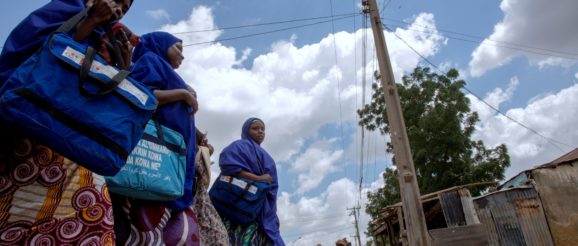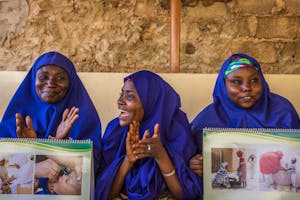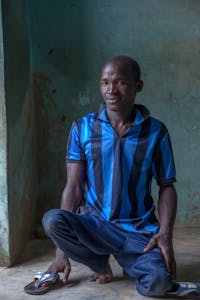Innovation in Action: Fighting Polio in Nigeria | unfoundation.org

The other major challenge is access. In a country that lacks roads in some of the most remote areas, reaching rural families can be especially difficult.
These leaders are not alone. They’re joined by a network of volunteers — all of whom are women — who serve as trusted community ambassadors of sorts, traveling door-to-door to educate households about immunization and administer the oral version of the polio vaccine as drops under the tongue.
Fatima Zakari works closely with these so-called “Volunteer Community Mobilizers” — or VCMs, as they are known. As an area facilitator for the local government, she helps traditional leaders recruit and train volunteers, each of whom is responsible for anywhere from 350 to 500 households in their regions. To date, 4.4 million children under the age of 5 have been vaccinated, according to UNICEF.
Zakari says these volunteers are crucial for UNICEF’s immunization outreach because services like these rely on personal relationships and trust.
“They are well-known and accepted by the community,” she says. “They are part of the community.”
These volunteers are mainly recruited from areas experiencing a high number of polio vaccine refusals, Zakari says. These women are typically 20 to 50 years old, well-known, and well-respected in their communities, some of whom can read and write in Hausa, the local language. Prospective candidates are then interviewed and, if selected, take part in a UNICEF-led clinical training program that teaches a variety of topics, including data management, communication, and how to spot signs of the disease.
Innovative approaches like these are part of a broader commitment by UN Secretary-General António Guterres to modernize the United Nations by embracing smarter technology, practices, and partnerships.
 A group of Volunteer Community Mobilizers at a health center in Kano State, Nigeria. (©Andrew Esiebo/UN Foundation)
A group of Volunteer Community Mobilizers at a health center in Kano State, Nigeria. (©Andrew Esiebo/UN Foundation)
Because of their success vaccinating vulnerable children, what began as a community of volunteers to fight polio has since evolved into an effective and integral part of Nigeria’s rural health care system.
Beyond administering the polio vaccine, these volunteers now cover a wide range of health topics during their household visits to keep families safe and healthy. They educate households on sanitation and hand-washing, the importance of prenatal care, the advantages of breastfeeding, and how to treat child malnutrition with therapeutic foods. They’re even trained to spot signs of emerging health threats like Ebola.
These volunteers also help UNICEF and the government of Nigeria track vital statistics like births and deaths, which can help authorities and agencies better understand the health care needs of a particular community — information that is crucial to understanding gaps as well as gains in health care access.
from survival to success
At the Gwagwarawa Health clinic in Kano state, you can still witness polio’s lifelong consequences in survivors like Addau Saidu, who was paralyzed as a young boy by the disease, which invades the nervous system and mainly affects children under the age of five.
 Addau Saidu is a polio survivor who now works with UNICEF to spread the word
Addau Saidu is a polio survivor who now works with UNICEF to spread the word
about the importance of vaccines in Kano State, Nigeria. (©Andrew Esiebo/UN Foundation)
Today, Saidu relies on a three-wheeled motorcycle to help UNICEF spread the word about the importance of the polio vaccine. “I thank God for the life I am living, but I am not comfortable,” Saidu told Foreign Policy in an interview last month.
“I want to tell the world that they should immunize their kids—especially in this area.”
